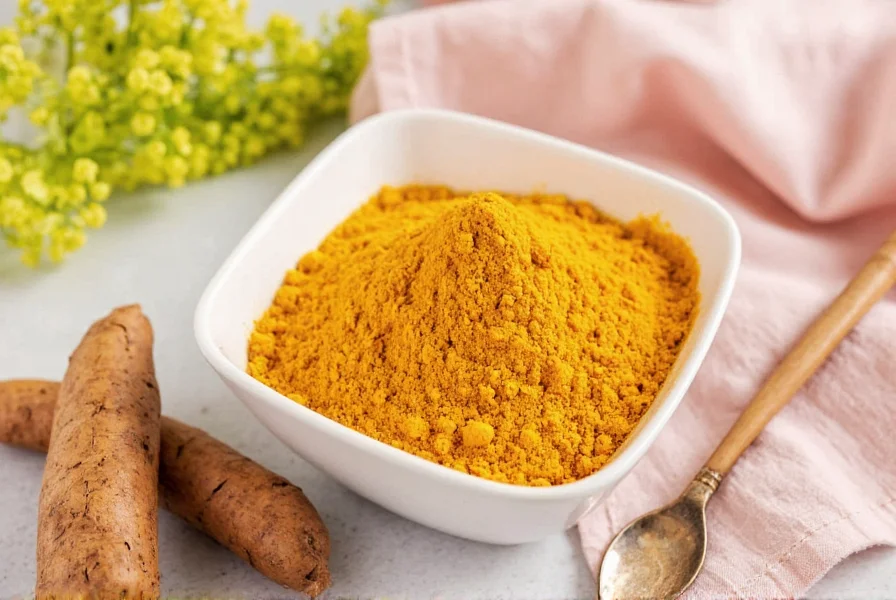Based on current medical evidence, culinary use of turmeric in normal food amounts is generally considered safe during pregnancy. However, turmeric supplements or medicinal doses should be avoided as they may stimulate uterine contractions and pose potential risks to pregnancy. Always consult your healthcare provider before using turmeric supplements while pregnant.
Many expectant mothers wonder about the safety of common spices during pregnancy, and turmeric frequently tops the list of concerns. This vibrant yellow spice, celebrated for its anti-inflammatory properties, requires special consideration when you're expecting. Understanding the distinction between culinary use and supplement intake is crucial for making informed decisions about turmeric and pregnancy.
Understanding Turmeric: More Than Just a Spice
Turmeric, derived from the Curcuma longa plant root, contains curcumin as its primary active compound. While small amounts used in cooking provide flavor and color, concentrated forms found in supplements deliver much higher doses that may affect pregnancy. The key question isn't whether turmeric is inherently dangerous, but rather what quantity and form presents during pregnancy.
Culinary Turmeric vs. Medicinal Supplements
The safety profile of turmeric changes dramatically based on consumption method. When evaluating turmeric and pregnancy safety, experts distinguish between:
| Form | Curcumin Content | Pregnancy Recommendation |
|---|---|---|
| Culinary turmeric (in food) | Approximately 200-500mg per teaspoon | Generally considered safe in normal cooking amounts |
| Turmeric tea | Varies by preparation | Limit to 1 cup daily; avoid concentrated formulas |
| Supplements (capsules, extracts) | Typically 400-2000mg curcumin | Avoid during pregnancy without medical supervision |
Potential Benefits of Moderate Turmeric Consumption
When used appropriately, culinary turmeric may offer some benefits during pregnancy. The anti-inflammatory properties of curcumin in small amounts could help manage normal pregnancy-related inflammation. Some research suggests turmeric's antioxidant effects might support overall wellness, though these potential benefits must be weighed against possible risks when considering turmeric supplements and pregnancy.
Understanding the Risks: Why Supplements Pose Concerns
Medical professionals express concern about turmeric supplements during pregnancy for several evidence-based reasons:
- Uterine stimulation - High doses may promote contractions, potentially leading to complications
- Blood thinning effects - Could increase bleeding risk during delivery
- Hormonal interactions - May affect estrogen metabolism
- Unknown fetal effects - Limited research on high-dose curcumin exposure to developing babies
These concerns primarily apply to concentrated supplements rather than food preparation amounts. The question of how much turmeric can I take while pregnant depends entirely on the form you're consuming.
Medical Guidelines for Turmeric Consumption During Pregnancy
Major health organizations provide consistent guidance regarding turmeric and pregnancy:
- The American Pregnancy Association states that "turmeric is safe to consume in food amounts during pregnancy but should be used cautiously in supplement form"
- WebMD notes that "pregnant women should avoid using turmeric supplements because they may stimulate the uterus"
- Mayo Clinic advises that "high doses of turmeric could potentially cause miscarriage" though this risk applies to supplement levels, not culinary use
When examining curcumin during pregnancy safety, researchers emphasize that normal dietary consumption doesn't reach levels associated with these risks.
Practical Recommendations for Expectant Mothers
If you're wondering about incorporating turmeric into your pregnancy diet, consider these evidence-based suggestions:
- Enjoy turmeric as a spice in cooking at normal culinary amounts (⅛ to ¼ teaspoon per dish)
- Limit turmeric tea to one cup daily, avoiding concentrated or medicinal preparations
- Avoid turmeric supplements, extracts, or medicinal products without explicit approval from your obstetrician
- Be cautious with golden milk or other turmeric-heavy beverages, especially during first trimester
- Read labels carefully on spice blends, as some may contain concentrated turmeric

Situations Requiring Extra Caution
Certain pregnancy circumstances warrant additional caution regarding turmeric consumption:
- History of miscarriage or preterm labor
- Taking blood-thinning medications
- Diagnosed with gallbladder issues
- Planned cesarean delivery (due to potential bleeding risks)
- First trimester pregnancy (when organ development occurs)
If any of these apply to you, discuss when to avoid turmeric when pregnant with your healthcare provider before consuming even culinary amounts.
The Importance of Professional Medical Advice
Every pregnancy is unique, and individual health factors significantly impact how your body responds to various substances. While general guidelines exist for medical advice on turmeric during pregnancy, your obstetrician or midwife can provide personalized recommendations based on your specific health profile, pregnancy progression, and any existing conditions.
Never discontinue prescribed medications or treatments based on turmeric consumption, and always disclose all supplements and herbal products to your healthcare team. Open communication ensures you receive the most appropriate guidance for your situation.
Making Informed Decisions About Turmeric and Pregnancy
Navigating dietary choices during pregnancy requires balancing potential benefits against possible risks. For turmeric, the evidence clearly supports enjoying this spice in normal food amounts while advising against supplement use without medical supervision. By understanding the distinction between culinary and medicinal applications, you can make informed decisions that support both your health and your baby's development.
Frequently Asked Questions
Can I drink turmeric tea while pregnant?
Yes, in moderation. One cup of lightly prepared turmeric tea daily is generally considered safe during pregnancy. Avoid concentrated or medicinal turmeric teas, especially during the first trimester. Always check with your healthcare provider if you have concerns about specific preparations.
Is it safe to eat curry during pregnancy?
Yes, eating curry with normal amounts of turmeric as part of your regular diet is generally safe during pregnancy. Most curry dishes contain turmeric in culinary amounts that don't pose risks. However, avoid extremely concentrated curry preparations or medicinal curry extracts.
Why should I avoid turmeric supplements when pregnant?
Turmeric supplements contain concentrated curcumin levels that may stimulate uterine contractions, increase bleeding risk, and potentially affect fetal development. These high doses differ significantly from the small amounts used in cooking, which are generally considered safe.
Can turmeric cause miscarriage in early pregnancy?
Normal culinary use of turmeric does not cause miscarriage. However, high doses from supplements may potentially increase miscarriage risk due to uterine stimulation effects. This is why medical professionals recommend avoiding turmeric supplements during pregnancy, particularly in the first trimester.
How much turmeric is safe to consume daily during pregnancy?
As part of your regular diet, up to ⅛ to ¼ teaspoon of turmeric per meal is generally considered safe. This amounts to approximately 200-500mg of curcumin daily from food sources. Always consult your healthcare provider for personalized recommendations based on your specific pregnancy.











 浙公网安备
33010002000092号
浙公网安备
33010002000092号 浙B2-20120091-4
浙B2-20120091-4